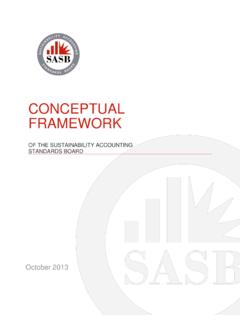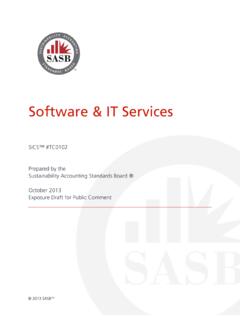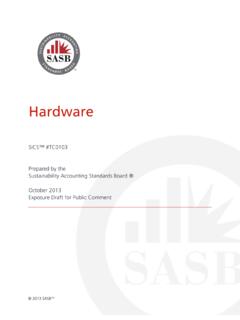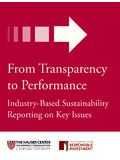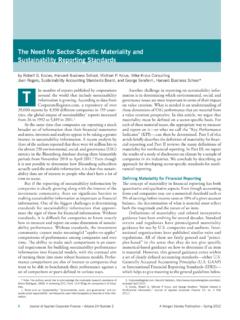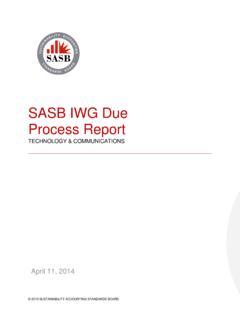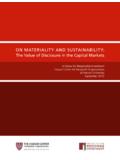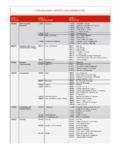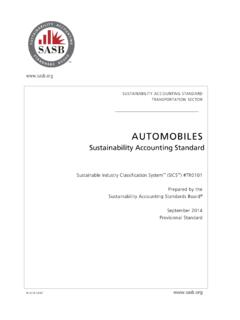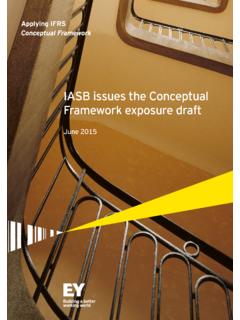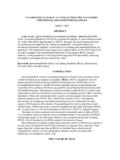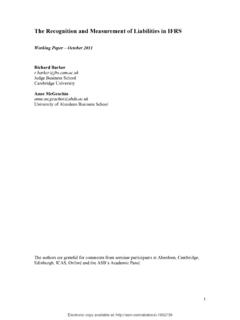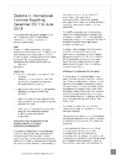Transcription of ALCOHOLIC BEVERAGES Sustainability Accounting …
1 Sustainability Accounting STANDARD CONSUMPTION I SECTOR 2015 SASB Sustainable Industry Classification System (SICS ) #CN0202 Prepared by the Sustainability Accounting Standards Board January 2015 Exposure Draft Standard for Public Comment BEVERAGESS ustainability Accounting Standard T M DRAFT 2015 SASB Sustainability Accounting STANDARD | ALCOHOLIC BEVERAGESSUSTAINABILITY Accounting STANDARDS BOARD75 Broadway, Suite 202 San Francisco, CA 94111 BEVERAGESS ustainability Accounting Standard The information, text, and graphics in this publication (the Content ) is owned by Sustainability Accounting Standards Board.
2 All rights reserved. You may use the Content only for non-commercial and scholarly use, provided that you keep intact all copyright and other proprietary notices related to the Content, and that you make no modifications to the Content. The Content may not be otherwise disseminated, distributed, republished, reproduced, or modified without the prior written permission of Sustainability Accounting Standards Board. To request permission, please contact us at SASBThe Sustainability Accounting Standards Board (SASB) provides Sustainability Accounting standards for use by publicly listed corporations in the in disclosing material Sustainability information for the benefit of investors and the public.
3 SASB standards are designed for disclosure in mandatory filings to the Securities and Exchange Commission (SEC), such as the Form 10-K and 20-F. SASB is an independent 501(c)3 non-profit organization. Through 2016, SASB is developing standards for more than 80 industries in 10 this StandardThis Standard is an exposure draft presented for public review and comment. This version is not intended for implementation. The public comment period lasts for 90 days, beginning on Wednesday, January 14th, 2015, and ending on Tuesday, April 14th, 2015. The Standard is subject to change thereafter. For instructions on providing comments to SASB, please click here.
4 DRAFTSUSTAINABILITY Accounting STANDARD | ALCOHOLIC BEVERAGEST able of ContentsIntroduction ..1 Purpose & Structure ..1 Industry Description ..1 Guidance for Disclosure of Material Sustainability Topics in SEC filings ..2 Guidance on Accounting of Material Sustainability Topics ..4 Users of the SASB Standards ..4 Scope of Disclosure ..5 Reporting Format ..5 Timing ..6 Limitations ..6 Forward Looking Statements ..7 Assurance ..7 Material Sustainability Topics & Accounting Metrics ..8 Greenhouse Gas Emissions ..9 Energy Management ..12 Water Management.
5 14 Responsible Drinking & Marketing ..15 Packaging Lifecycle Management ..19 Environmental & Social Impacts of Ingredient Supply Chains ..22 2015 SASB DRAFTINTRODUCTION Purpose & Structure This document contains the SASB Sustainability Accounting Standard (SASB Standard) for the ALCOHOLIC BEVERAGES industry. SASB Standards are comprised of (1) disclosure guidance and (2) Accounting standards for Sustainability topics for use by and foreign public companies in their annual filings (Form 10-K or 20-F) with the Securities and Exchange Commission (SEC). To the extent relevant, SASB Standards may also be applicable to other periodic mandatory filings with the SEC, such as Forms 10-Q, S-1, and 8-K.
6 SASB s disclosure guidance identifies Sustainability topics at an industry level, which may be material depending on a company s specific operating context to a company within that industry. Each company is ultimately responsible for determining which information is material and is therefore required to be included in its Form 10-K or 20-F and other periodic SEC filings. SASB s Accounting standards provide companies with standardized Accounting metrics to account for performance on industry-level Sustainability topics. When making disclosure on Sustainability topics, companies adopting SASB s Accounting standards will help to ensur e that disclosure is standardized and therefore useful, relevant, comparable, and auditable.
7 Industry Description The ALCOHOLIC BEVERAGES industry includes companies involved with brewing, distilling, distributing, and manufacturing various ALCOHOLIC BEVERAGES , including beer, wine, and liquor. The largest companies in the industry have global operations, many of which are companies headquartered outside the Many state laws bar companies from vertically integrating into distribution and retailing of ALCOHOLIC BEVERAGES , forcing the industry to maintain a three-tier system between producers, wholesale distributors, and retailers. Companies operating abroad in Europe do not face similar three-tier systems and are allowed to vertically integrate.
8 2015 SASB Sustainability Accounting STANDARD | ALCOHOLIC BEVERAGES 1 DRAFTG uidance for Disclosure of Material Sustainability Topics in SEC Filings Sustainability T opicsFor the ALCOHOLIC BEVERAGES industry, SASB has identified the following Sustainability topics: Greenhouse Gas Emissions Energy Management Water Management Responsible Drinking & Marketing Packaging Lifecycle Management Environmental & Social Impacts ofIngredient Supply Determination and Disclosure of Material Sustainability TopicsSustainability disclosures are governed by the same laws and r egulations that govern disclosures by securities issuers generally.
9 According to the Supreme Court, a fact is material if, in the event such fact is omitted fr om a particular disclosure, there is a substantial likelihood that the disclosure of the omitted fact would have been viewed by the reasonable investor as having significantly altered the total mix of the information made available. 1, 2 SASB has attempted to identify those Sustainability topics that it believes may be material for all companies within each SICS industry. SASB r ecognizes, however, that each company is ultimately r esponsible for determining what is material to it.
10 Regulation S-K, which sets forth certain disclosure requirements associated with Form 10-K and other SEC filings, requires, among other things, that companies describe in the Management s Discussion and Analysis of Financial Condition and Results of Operations (MD&A) section of Form 10-K any known tr ends or uncertainties that have had or that the r egistrant r easonably expects will have a material favorable or unfavorable impact on net sales or revenues or income fr om continuing operations. If the r egistrant knows of events that will cause a material change in the relationship between costs and r evenues (such as known future increases in costs of labor or materials or price increases or inventory adjustments), the change in the r elationship shall be disclosed.
